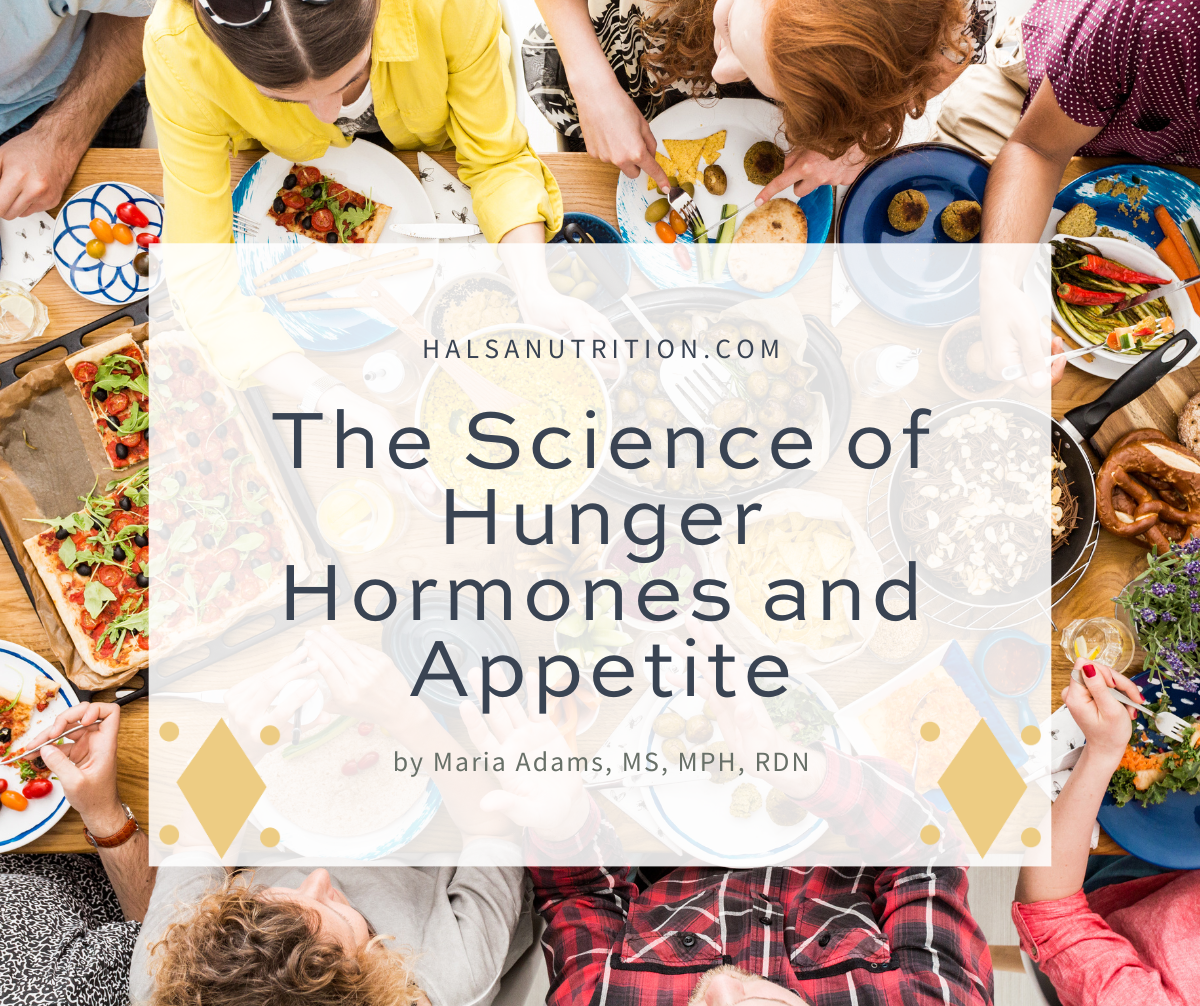
The Science of Hunger Hormones and Appetite
Estimated reading time: 7 minutes
Hunger hormones play a crucial role in regulating appetite. Understanding the science of these hormones and other variables that affect our appetite can provide valuable insights into our eating behaviors and overall health.
What are hunger hormones?
Our bodies have several different hormones that regulate hunger. While they all have slightly different roles, they all work in conjunction with our brain and gut to signal hunger and satiety.
Humans are born intuitive eaters. Without even realizing it, we respond to our hunger by seeking out food and eating until we are satisfied. However, in this day and age of diet culture, stress, and distracted eating, it’s easy for our brain to override these natural cues.
Understanding our hunger hormones can provide valuable insight into the physiological reactions happening in our bodies. Another tool that can help is using a hunger and fullness scale to gauge your hunger level before, during, and after meals. Now, let’s take a look at the main hunger hormones.

Hormones that stimulate hunger
Ghrelin
The stomach secretes ghrelin, also known as the “hunger hormone.” Growling stomach? That’s ghrelin! Ghrelin increases before meals and decreases after eating. It encourages food intake, influences how the body stores fat, and regulates energy use. Ghrelin levels increase on low-calorie diets, increasing hunger and thoughts of food to drive the individual to seek out food.
Neuropeptide Y (NPY)
NPY is produced in a region of the brain known as the hypothalamus. Activated by ghrelin, this hormone stimulates hunger and tells us to seek out food, especially carbohydrate-rich food.
Hormones that stimulate fullness
Insulin
When we eat carbohydrate-containing food, the pancreas releases insulin into our bloodstream. This hormone allows glucose to enter cells. Insulin helps signal satiety to the brain, resulting in decreased hunger.
Leptin
Leptin is known as the “satiety hormone.” It is produced by fat cells and helps to regulate energy balance by inhibiting hunger. Interestingly, leptin levels rise with increased fat stores, signaling the brain to reduce appetite and increase energy expenditure. Low leptin levels stimulate hunger; this happens when weight loss occurs, reducing leptin and motivating an individual to eat more to reestablish fat stores. High body fat is associated with leptin resistance, resulting in hunger despite high leptin levels.
Peptide YY (PYY)
The intestines release PYY in response to food intake, particularly protein and fat. PYY helps to reduce appetite and increase feelings of fullness. Higher levels of PYY occur after meals, making it an essential player in short-term appetite regulation.
Cholecystokinin (CCK)
The small intestine releases CCK when chyme (food) enters the area known as the duodenum. The presence of protein and fat contributes to the release of CCK and signals satiety and fullness. This hormone also tells the body to release digestive enzymes and bile.
Glucagon-like Peptide-1 (GLP-1)
GLP-1 is another intestine-produced hormone that enhances insulin secretion and reduces appetite. The newest weight loss medications are GLP-1 antagonists that mimic the natural GLP-1 hormones in the body.
Other factors that affect our hunger and appetite
Many other factors affect our hunger and appetite. Let’s take a brief look:
- Sleep – A lack of sleep can lead us to seek food, especially carbohydrate-rich food, for more energy. Studies show that not getting enough sleep increases ghrelin and reduces leptin.
- Stress – Chronic stress can increase cortisol levels. This can also elevate ghrelin and suppress leptin, increasing hunger and cravings for high-calorie foods.
- Exercise – In general, exercise increases our need for food and, therefore, our appetite. However, intense exercise can also temporarily blunt appetite.
- Distractions – Whether you’re fully engrossed in your work or scrolling on your phone while eating, distractions can take you away from tuning into your hunger and fullness.
- Menstrual cycle – For women, it’s common to be hungrier at different times of the menstrual cycle. This is due to changes in both hormone levels and metabolism.
- Emotional eating – Food is a source of comfort and pleasure. It makes sense then, that we often turn to food during times of emotional discomfort.
- Pleasure and taste – Let’s face it, sometimes you want to eat a food just because it tastes so good! In intuitive eating this is often referred to as “taste hunger.”
- Dieting – Restriction causes our hunger hormones to build up until we eventually end up ravenously hungry. We may also adopt the “last supper mentality,” leading us to overeat because we plan to start a new diet or don’t know when we will have “all that good food” again.

It should be noted that these are all valid reasons for eating. There is no right or wrong with intuitive eating. However, by becoming more in tune with our hunger and better managing other variables such as sleep and stress, we can help our bodies get enough food, but not too much (a lagom amount).
Why is it easy to eat more than we need?
If our bodies signal fullness, why do we sometimes eat past the point of fullness? This happens for many reasons, but one underlying reason is that we are programmed to seek food and eat it! This is what has kept us alive and helped us survive famine. We have not yet evolved to deal with our current situation: abundant food, less movement, and at the same time, restriction/dieting.
Our bodies don’t know the difference between a famine and a diet. So when we restrict, our brain tries to fight this by sending out alarms (aka, hunger cues) to get us to seek out food and eat. This often leads to overeating due to built-up hunger and an internal fear that there will be another food restriction, and therefore, we better eat as much as we can now.
How to become more in tune with your hunger hormones
So, how can you become more in tune with your hunger hormones? Here are some tips:
- Follow a regular eating schedule. When it comes to eating, our bodies thrive with an established rhythm. Start the day with breakfast and eat regularly throughout the day (every 3-4 hours for most people). Meal prep and planning can be a helpful way to stick to regular meals. Another strategy is to set a reminder on your phone to take a break for lunch.
- Respond to your hunger and fullness cues! Part of intuitive eating is honoring your hunger by eating and learning to feel your fullness when you have had enough to eat. Using the hunger and fullness scale to help you become more in tune with these cues.
- Practice mindful eating. Eating mindfully can help us become more aware of our hunger and fullness signals, making us less likely to overeat. There are many strategies to enhance mindfulness.
- Slow down your eating. It takes about 20 minutes from the time you start eating for the gut to communicate fullness to the brain. When you eat quickly, you increase the likelihood of eating past the point of comfortable fullness. Strategies to slow down the pace include setting your fork down between bites, conversing between bites, and eating regular meals throughout the day so that you don’t get over-hungry.
- Get enough sleep.
- Manage stress.
Of course, it should also be noted that you can’t “trick” your body into thinking it’s not hungry. Drinking two glasses of water when you need food, chewing gum instead of eating a snack, and choosing diet food products are all restrictive habits that can escalate the binge-restrict cycle and lead to disordered eating. Instead, befriend your body. Listen. Get curious. And respond with kindness.
Bottom line
Your body’s hunger hormones are highly regulated to help you seek out and eat enough to stay alive. That said, overriding our natural programming in this age of diet-culture is easy. Learning more about the hunger hormones and other factors that affect your hunger and appetite can help you become more in tune with your body, leading to greater health and well-being.
Additional posts you might like
- The Gut-Brain Connection and How It Impacts Digestion
- The Hunger Fullness Scale
- From Stress Eating to Comfort Food: Understanding Emotional Eating
- Meal Satisfaction: 12 Ways to Increase It
About the author
Maria Adams, MS, MPH, RDN, LDN, a registered dietitian and Certified Intuitive Eating Counselor. Maria takes a weight-inclusive approach and helps individuals rediscover the joy of food, learn how to nourish to feel their best, and heal from chronic dieting and disordered eating. She holds a Bachelor of Science Degree in Nutrition Science, a Master of Science in Nutrition Communication, and a Master of Public Health.
Leave a Reply